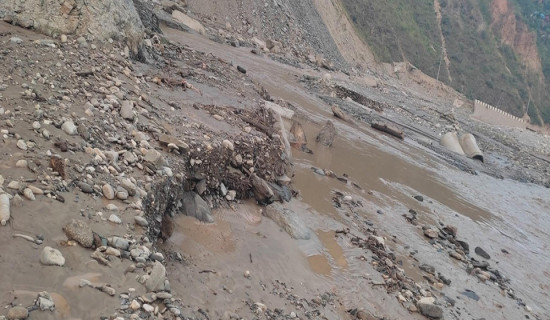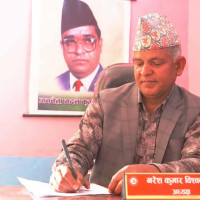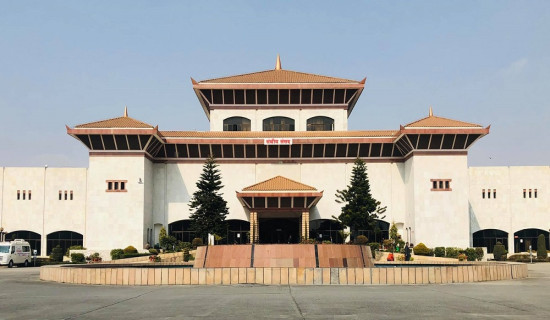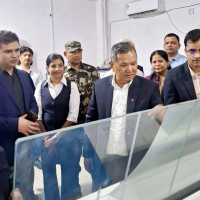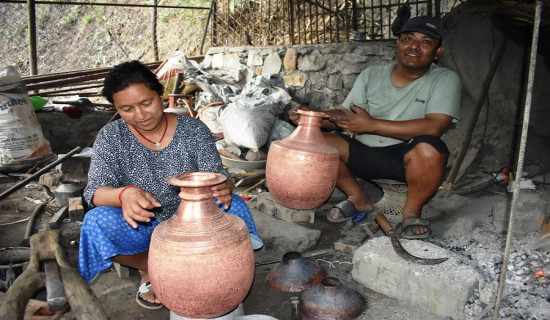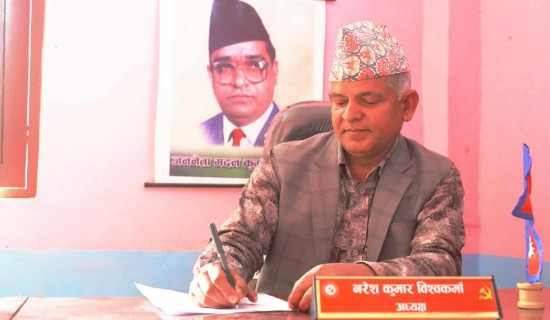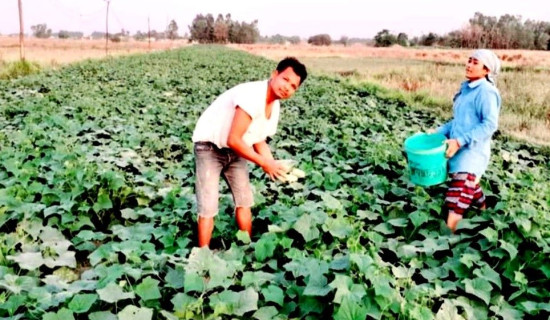- Tuesday, 13 May 2025
Acute drinking water shortage driving people from villages
By Chitra Mijar/Lalit Basel,Sindhupalchowk/Surkhet, Mar. 19: There is a settlement of around 56 families of Majhi community at Bisiutar in Ward No. 11 of Indrawati Rural Municipality of Sindhupalchowk district. A drinking water tap was constructed several years ago for the families.
However, it has been two years since the water dripped down the tap last time. Almost all the settlements across the 12 local levels of Sindhupalchowk have taps, but no water runs through them.
Over the years, several taps have been constructed across the district with the support of local, provincial and federal governments alongside different organisations. Nevertheless, no proper infrastructure has been constructed to bring water to the taps.
According to the community, they have been carrying water from a well near the bank of the Indrawati River. Many families have also been digging small pools to store water during winter. "We have no drinking water even for ourselves, let alone for cattle, irrigation, cooking, bathing, and washing clothes," said Sanishanti Majhi, a local.
Indrawati Rural Municipality constructed the tap three years ago at a cost of Rs. 1 million. But to this day, it is unsure when the water would flow from it. When asked for comments, municipality officers replied, "We are taking steps to bring water to the taps."
Even so, people all over the district have been hearing the same from the local level representatives of their respective municipalities.
The problem facing locals of Gaurati in Ward No. 6 of Chautara Sangachowkgadhi Municipality is similar, if not worse: they don’t even have a tap installed for their settlement.
Gaurati is home to 153 families in all. They relied on the water from a stone spout until 2015. "However, the calamitous earthquake that struck that year dried up the water sources, leaving us in dire shortage of drinking water," said Chandra Karki, a local.
It has been seven years, say Gaurati locals, that they have been waiting for hours in queue carrying a pitcher to fill water. "Three years ago, the local government of the day provisioned Rs. 70,000 for a tap. But the amount didn’t suffice even to buy enough pipes," said Karki.
Likewise, Prem Bahadur Bhandari from the Purano Chhap village in Ward No. 3 of Balephi Rural Municipality, informed that the villagers were waiting years for the water to flow through the constructed tap."Despite taps being constructed in every village, there is no water. We have drawn the attention of everyone in authority, but to no avail,"
said Bhandari.
The scarcity of drinking water is so severe that it has forced many families from their villages over the years.
Meanwhile, the problem in the hundreds of kilometers west of Sindhupalchowk, in the valley of Surkhet, is no less dire. Chaukune Rural Municipality, in Surkhet district, is reeling under acute scarcity of water, too.
While there were around 115 families in Rekcha, a village in Ward No. 5 of Chaukune, until five years ago, the number has declined to 80 recently. The families have migrated to Gut, Bijaura, Kailali and Panchapuri regions nearby.
"The only factor pushing the families out of the village is the shortage of drinking water," said Jitan BC, a local.
There are 18 wells for drinking water in the village, out of which 12 dried up a month ago. "There is water in the remaining wells, but it is polluted, leaving us with no choice but to use it for all purposes, including drinking," said Gajaraj BC, a 51-year-old local.
The limited availability of water has compelled locals to hire a security guard to make sure that everyone gets their fair share of water. Under the arrangement, every family gets two pitchers of water daily, and the guard gets a pathi (80 fistful) of wheat in exchange for his security.
Jagat Shahi, the security guard, monitors the distribution of water every day from 6 am to 10 am.
The scarcity reaches its peak from mid-December to mid-July, when the monsoon starts to recharge the parched well. "Unless there is a ritual or ceremony, such as marriage, no family is allowed to take more than two pitchers of water," said Shahi.
"We use the allotted water for cooking, drinking and toilet use. If we need to bath or wash clothes, we have to walk for two hours to reach the nearby river. If we need more drinking water for the house, we have to walk around three to four hours to reach Ranagaura village," said Nanda Joshi, a local.
The Karnali Province government had last year allocated a budget of Rs. 4.5 million to repair the wells. "Despite the repair, the wells dry up during summer and winter, leading to water shortage," said Tapendra BC, a local and a ward member of Ward No. 5 of Chaukune. To ease the suffering, the provincial government allocated Rs. 12.6 million to construct a lifting drinking water project. However, a lack of electricity has meant that the project has remained in limbo.
"The project site is not reachable by road, meaning that an electric transformer hasn’t been transported there. We have earmarked budget for the road construction. Once it is completed, there will be no shortage of drinking water again," said Nar Bahadur Bantola, vice chairperson of Chaukune.
While local representatives expect the planned drinking water project to solve the problem, there is no end to the locals leaving their villages in droves in search of places where could get enough water. Their doubt that the projects will materialise soon enough has only added to the concern.



